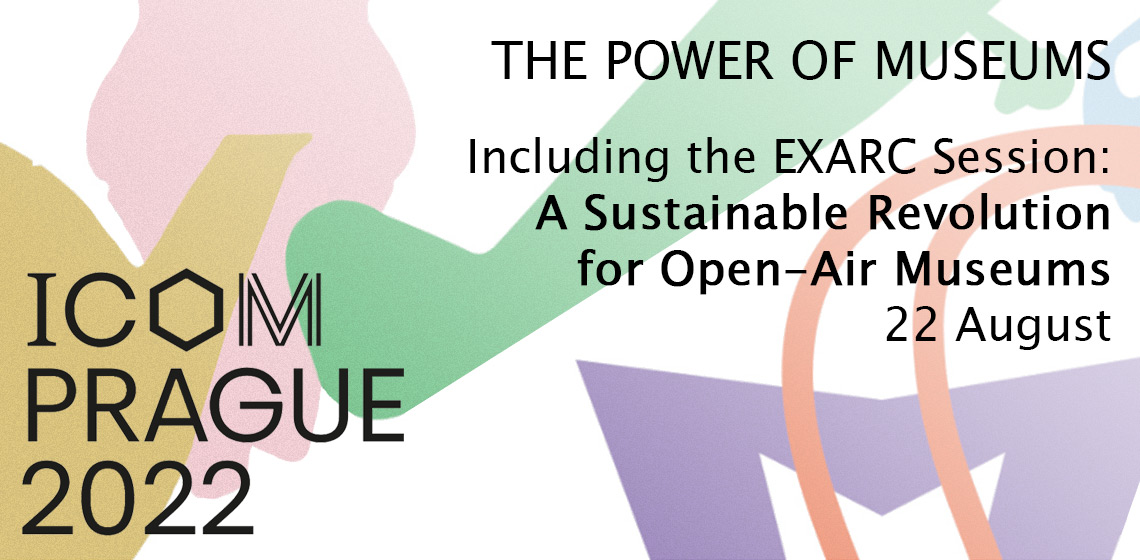The content is published under a Creative Commons Attribution Non-Commercial 4.0 License.
Unreviewed Mixed Matters Article:
Conference Review: The ICOM Museum Convention in Prague, August 2022

The International Council of Museums, ICOM, has a habit of meeting every three years in a large General Conference. The last time was in Kyoto, Japan, in 2019. EXARC was present there, and we witnessed a heavy debate on the museum definition, but also spoke with many museum professionals from Japan and abroad. We worked in close cooperation with ICOM Netherlands that time, as we did three years earlier in Milan.
As with every large convention, the ICOM General Conference is a challenge if you do not know enough people. It is important to be in good contact with your national committee but also the international committees, each of which revolves around a theme. There were several relevant committees, for example one on public relations (PR), one on education and one focusing on historical and archaeological museums. There were, however, another dozen committees which were relevant to EXARC, for example the committee on museum management. Besides that, there were working groups, such as one on the United Nations Sustainable Development Goals.
The conference in Prague was the first one at which affiliated organisations such EXARC could present. We decided to organise a small session under the title “A Sustainable Revolution for Open-Air Museums” which was a teaser for the open access conference EXARC held online on the same day. In Prague, we showed three presentations, outlining exactly how much progress museums can make without a great deal of effort. Thanks to the session, we got in contact with colleagues from the Ukraine, Georgia and Denmark, whom we otherwise would not have met. The session, with its 13 papers, went well, and is discussed elsewhere.
The General Conference in Prague was the first hybrid General Conference of ICOM, and although many things went well, the system could have been simplified. Also, there was hardly any contact possible between the online participants and those present in Prague. This will be an important challenge for the next General Conference in Dubai in 2025.
There were over 20 simultaneous sessions during the busiest afternoon. Obviously the most popular ones (like on LGTB and museums) were overbooked but it is expected that a lot of the presentations will be published and therefore will be accessible to a wider audience. There was a good off-site program in the evenings, starting at the Dutch embassy which took place at the National Museum and at many other sites in between. These venues, just like the hotel where many Dutch participants resided, were excellent locations for catching up and meeting new colleagues.
At the Extraordinary General Assembly, ICOM approved a new museum definition. As ICOM described it:
The vote is the culmination of an 18-month participatory process that involved hundreds of museum professionals from 126 National Committees from all over the world. It now includes important changes in what the roles of museums are, recognising the importance of inclusivity, community participation and sustainability.
Source: https://icom.museum/en/news/icom-approves-a-new-museum-definition
The definition reads:
A museum is a non-for-profit, permanent institution in the service of society that researches, collects, conserves, interprets and exhibits tangible and intangible heritage. Open to the public, accessible, and inclusive, museums foster diversity and sustainability. They operate and communicate ethically, professionally and with the participation of communities, offering varied experiences for education, enjoyment, reflection and knowledge sharing.
Source: https://icom.museum/en/resources/standards-guidelines/museum-definition
Having the definition accepted was an extremely important result. The refusal of the definition three years earlier highlighted the important internal problems with which ICOM is still dealing. The hope was that the almost unanimous acceptance of the definition in Prague will be an important step in solving the issues. Equally important were the elections in the ICOM structure – at all levels – putting some people in place that can help make the change ICOM needs so much. EXARC should now look carefully at its own definition of archaeological open-air museums from 2008 and see where this could lead.
While the ICOM structure itself may be difficult to understand or appreciate, the immense value for EXARC lies in the many able museum professionals from around the world. These people have an interesting perspective on the issues that we, EXARC and many of our members, are dealing with. Sometimes in ICOM we discuss very pragmatic issues like opening times, only a minute later we are discussing ethics, especially when we hear how museum directors are being replaced by political representatives without a clue about museum management. If anything, it is a pleasure to discuss all aspects of our museum profession with ICOM members from near and afar: it is definitely worth joining!
Keywords
Country
- Czech Republic

